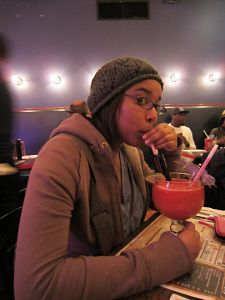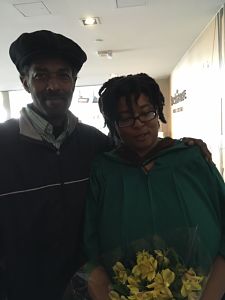Now What?

I bought this not long after I completed my Bachelor’s. I only looked through it once.
I graduated two weeks ago, but it feels like a year went by. Blame it on the holidays and their ability to warp the passage of time, but between then and now I devolved into a couch potato. I slept in, binge watching as I laid on my mess of a bed. Doing anything more strenuous than holding a pen was too much to handle. It still is. In truth, my brain is still trying to process the fact that I’m finally finished with school.
Being in denial can be helpful if you look at it a certain way. Kinda. It’s reassuring to lock myself in my room and focus on things that don’t matter in the long run. Binge watching crappy shows and living off junk food is much easier than filling out that job application or completing that rough draft that’s due in five hours. Especially that rough draft. To fill out that job application and finish that draft mean accepting that I’m done with school and ready to move on to the next chapter in my life. But I’m not ready. Not one bit.
* * *
Growing up, my mother’s family stressed the importance of education. Having a good education meant opportunities, which is why she and her sisters moved to the States in the first place. My grandmother was the most aggressive about it. She didn’t have a chance to finish her education; I vaguely remember her telling me she never completed grammar school, and she wished she had the chance. My mom got farther, making it to college until it got too expensive. Every once in a while she would go back to some online institution, only to drop out soon after. They knew better than anyone the true cost of a good education, and they made sure we knew the sacrifices.
The teachers and counselors became more aggressive as I entered high school.
“Do you want to flip burgers for the rest of your life?” the college counselor asked once during history class.
It felt less like a question and more like a reprimand. If you weren’t planning on going to college, you weren’t giving enough thought to your future. Until two weeks ago at graduation, going to school was—is—all I know. What does a person do after all this? The obvious answer would be to work in the area I got my degree in, to be a writer and do whatever it is that a writer does (aside from writing, anyway). But that’s too simple for my overactive mind to accept. It insists there’s something more to post-grad life when there really isn’t. This is it.
The realization makes me freeze up. Five years ago, I couldn’t wait to be done with school, to finally have a job and get a place of my own. Now, the very thought of these things gives me an anxiety attack. Not because I’m resisting the transition, but because I’m afraid of what will happen when I’m not able to get those things. You can’t fail if you don’t give anything a shot.
* * *

My 21st birthday at Dallas BBQ.
About six years ago, I moved to Los Angeles to live with my dad. My decision was a selfish one; it wasn’t to get to know him better as he re-entered my life, but to get away from everything. During my first year of college, my mom was laid off from a firm she worked at for ten years. She told my brother and I not to worry at first, that she would find a job and everything would go back to normal. The weeks turned to months, then to a year, until it became the new normal. I was expected to get a job of my own to help with bills, so I applied to some stores I regularly shopped at. When that didn’t work, I tried everywhere else. Anywhere else—a department store, a salesperson for a pyramid scheme, any coffee shop or bookstore I came across. Every other week, I would come home from campus and Mom would ask if I found a job yet.
It was around this time that I stopped asking myself what getting a degree would mean for me and what it would mean for my family instead. Guilt crept up on me as my grades slipped. I started skipping class on the days I did manage to get to campus on time. All the while, the pressure continued to gnaw at the back of my head until I snapped one evening during yet another argument over how I wasn’t contributing. I turned away from Mom as she yelled at me, picked up the phone and called Dad.
“I don’t want to be here anymore,” I said as he answered. “Get me out of here.”
About six months later, I got a check in the mail from Lehman College. It was my refund from dropping out. It didn’t occur to me to use that money to help me start a new life. I was so focused on getting away from everything that I didn’t fully consider the consequences. So I did what any unemployed twenty-something slacker would do with three grand: I dined out and bought a lot of cheap booze.
* * *
I was out of college for a year. The California college system took time to get around, and I had very little patience to learn it. I couldn’t find any college that allowed for mid-term transfers, so I took it as a sign to take a break. For a moment, I wondered if going back was the right idea. It didn’t do me any favors. But then I thought of my mom and grandmother, and how disappointed they would be. Especially my mother, who had lost so much. She never got a job as stable or well paid since. The downside of being a college dropout in your fifties. Going back to complete my degree wasn’t so important anymore. Going back to validate my mother’s sacrifices were.
* * *
“What do you want to do after this?”
I’m sitting down with my mentor in his office. I was going into my final project period for my MFA, and talk turned to my post-grad prospects. I told him that I wanted to write, maybe get a teaching gig on the side. Whatever was necessary to let me help out Mom. I never gave much thought beyond that. I just knew it was something I had to do.
He reminded me that writing doesn’t pay much. It’s not enough if supporting my family is my main priority. “What do you want to get out of this program?”
I knew the answer to this question. And yet I felt doubt as I said it out loud. A few months later, he asked the question again. I mailed him my response with the rest of my work, but for the life of me I can’t remember what I told him. For the first time in my life, I don’t know what I want to do.
* * *

Dad and I at graduation. Photo by Brad Kessler.
I wrote down a six-month plan for my post-grad life. It’s not much–a list of places I want to get published in and some random errands still waiting to be done. I look at the abandoned plan and make a mental note to go back to it when I have some free time. Despite the fact that it’s incomplete, looking at what I hope to accomplish gives me a small glimmer of hope. I stayed on for another semester to set up an online course. I’m excited, but once in a while the anxiety returns to screw with my head.
The thing about attending school for so long is that you fantasize about your life getting better to the point where you don’t see your goal as a possibility anymore, only as a fantasy. It feels too good to be true. I’ve managed to push through all the bullshit, and it feels surreal to be standing on the other side and realize not much has changed.
* * *
The day before graduation, Mom called me. She wanted to tell me how proud she was of how far I’ve come. She wasn’t the only one who said it that week, and she wasn’t the only family member who felt that way. But hearing it from her carries a different meaning. It makes things clearer. The impossible seems possible. For a moment.
 Lily Caraballo is a graduate of the MFA in Creative Writing Program at Antioch University Los Angeles and a figure model. She is a staff member of Lunch Ticket, a former contributor for Black Girl Nerds, and is featured in the anthology My Body, My Words: A Collection of Bodies. She lives in Los Angeles with her cat.
Lily Caraballo is a graduate of the MFA in Creative Writing Program at Antioch University Los Angeles and a figure model. She is a staff member of Lunch Ticket, a former contributor for Black Girl Nerds, and is featured in the anthology My Body, My Words: A Collection of Bodies. She lives in Los Angeles with her cat.





